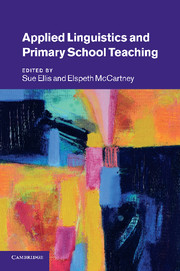Book contents
- Frontmatter
- Contents
- List of figures
- List of tables
- Notes on contributors
- Preface
- Editors' notes and conventions
- Introduction
- Part I Policy and diversity in the twenty-first-century primary school
- Part II The range and focus of applied linguistics research
- Part III Empowering teachers and teachers' use of knowledge
- Introduction to Part III
- 15 Building knowledge about language into a primary teacher education course
- 16 Using the International Phonetic Alphabet to support accurate phonics teaching
- 17 Developing word-level literacy skills in children with and without typical communication skills
- 18 The development of the Speech, Language and Communication Framework (SLCF)
- 19 How to empower teachers working with children with language impairments: why a ‘just-in-time’ model might work
- 20 Communication impairment in a multilingual context
- 21 Teacher education and applied linguistics: what needs to be understood about what, how and where beginning teachers learn
- References
- Index
20 - Communication impairment in a multilingual context
Published online by Cambridge University Press: 26 April 2011
- Frontmatter
- Contents
- List of figures
- List of tables
- Notes on contributors
- Preface
- Editors' notes and conventions
- Introduction
- Part I Policy and diversity in the twenty-first-century primary school
- Part II The range and focus of applied linguistics research
- Part III Empowering teachers and teachers' use of knowledge
- Introduction to Part III
- 15 Building knowledge about language into a primary teacher education course
- 16 Using the International Phonetic Alphabet to support accurate phonics teaching
- 17 Developing word-level literacy skills in children with and without typical communication skills
- 18 The development of the Speech, Language and Communication Framework (SLCF)
- 19 How to empower teachers working with children with language impairments: why a ‘just-in-time’ model might work
- 20 Communication impairment in a multilingual context
- 21 Teacher education and applied linguistics: what needs to be understood about what, how and where beginning teachers learn
- References
- Index
Summary
Introduction
According to a recent government review in England carried out by John Bercow (DCSF 2008b) around 7 per cent of children entering primary school are thought to have speech, language and communication needs (SLC needs: also referred to here with the covering term communication impairment). This figure includes children who have SLC difficulties that are secondary to diagnosed conditions such as hearing impairment, autistic spectrum disorder or neurological impairments, and also the significant number of children who have primary communication impairments for which there is no immediate or obvious cause. There is some evidence to suggest that children living in conditions of social deprivation are particularly vulnerable to delays in language impairment (see, e.g., Locke et al. 2002; Clegg and Ginsborg 2006), but communication impairment is by no means restricted to this group. A fundamental assumption when considering communication impairment is that vulnerability is not affected by the child's first language or languages. This means it is not the case that English-speaking children are more or less vulnerable than, say, Japanese-speaking children. So we would expect similar proportions of children to experience SLC needs in communities where English is not spoken as a first language, or where the community is bi- or multilingual. Features of the child's environment will have an influence, but not the specific language(s) spoken.
Information
- Type
- Chapter
- Information
- Applied Linguistics and Primary School Teaching , pp. 267 - 275Publisher: Cambridge University PressPrint publication year: 2011
Accessibility standard: Unknown
Why this information is here
This section outlines the accessibility features of this content - including support for screen readers, full keyboard navigation and high-contrast display options. This may not be relevant for you.Accessibility Information
- 2
- Cited by
